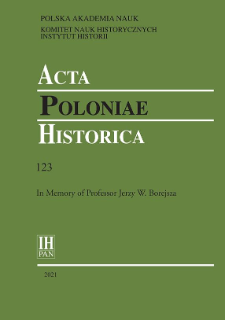- Search in all Repository
- Literature and maps
- Archeology
- Mills database
- Natural sciences
Advanced search
Advanced search
Advanced search
Advanced search
Advanced search

Object
Title: From Paris to Izmir, Rome, and Jerusalem: Armand Lévy as the Missing Link between Polish Romantic Nationalism and Zionism
Subtitle:
Acta Poloniae Historica T. 123 (2021), In Memory of Professor Jerzy W. Borejsza
Institutional creator:
Polska Akademia Nauk. Komitet Nauk Historycznych
;
Polska Akademia Nauk, Instytut Historii im. Tadeusza Manteuffla
![]()
Contributor:
Instytut Historii Polskiej Akademii Nauk
Publisher:
Place of publishing:
Description:
Abstract:
This article focuses on Armand Lévy, Adam Mickiewicz’s secretary, as the missing link between Romantic Polish nationalism and proto-Zionism. It examines Lévy’s interpretation of Adam Mickiewicz’s use of Jewish motifs and how Lévy’s interpretation provided his friend and neighbour in Paris, Moses Hess, a German-Jewish socialist, colleague and rival of Karl Marx, with a repertoire he had lacked to structure his proto-Zionist ideas.The article discusses how ideas from one cultural sphere were transferred to others. Mickiewicz, seeking to find ways to strengthen the Polish nation-building process following the partition of his motherland, used his interpretation of the contemporary Jewish Diaspora as a model. His secretary, the Frenchman Armand Lévy, reinterpreted Mickiewicz’s interpretation. His convoluted life course eventually led him to think about the Jews in nationalist terms via the discursive tools he acquired from Mickiewicz. Going beyond the latter’s views, Lévy regarded the Jews as a diasporic nation aspiring to gain political statehood. He championed Jewish messianism as a concrete step towards the Jews’ sovereignty. This, in turn, provided Moses Hess with a repertoire he had lacked until this point: namely, an acquaintance with Jews who were committed to renewing the sovereign Jewish life as of old.The article shows how Armand Lévy – a person acting in a sociological ‘contact zone’, i.e. in a social space where cultures meet, clash, and grapple – was able to cross the boundaries of Frenchness, Polishness, Jewishness, cosmopolitanism and nationalism, transferring motifs between Jewish and non-Jewish émigrés in complex ways which provoked unexpected results.
References:
Borejsza Jerzy W., Sekretarz Adama Mickiewicza: (Armand Lévy i jego czasy 1827–1891) (Gdańsk, 2005).
Katz Jacob, Leumiyut yehudit masot u-mekhkarim (Jerusalem, 1979).
Scheps Samuel, Armand Lévy: compagnion de Mickiewicz – révolutionnaire romantique (London, 1977).
Shimoni Gideon, The Zionist Ideology (Hannover–London, 1997).
Silber Marcos, ‘Stateless Nation: A Reciprocal Motif between Polish Nationalism and Zionism’, in Kenneth B. Moss, Benjamin Nathans, and Taro Tsurumi (eds), From Europe’s East to the Middle East: Israel’s Russian and Polish Lineages (Philadelphia, 2021), 87–116.
Relation:
Volume:
Start page:
End page:
Detailed Resource Type:
Format:
Resource Identifier:
oai:rcin.org.pl:204226 ; 0001-6829 ; 2450-8462 ; 10.12775/APH.2021.123.04
Source:
IH PAN, sygn. A.295/123 Podr. ; IH PAN, sygn. A.296/123 ; click here to follow the link
Language:
Rights:
Creative Commons Attribution BY-ND 4.0 license
Terms of use:
Copyright-protected material. [CC BY-ND 4.0] May be used within the scope specified in Creative Commons Attribution BY-ND 4.0 license, full text available at: ; -
Digitizing institution:
Institute of History of the Polish Academy of Sciences
Original in:
Library of the Institute of History PAS
Projects co-financed by:
National Programme for the Development of the Humanities
Access:
Object collections:
- Digital Repository of Scientific Institutes > Partners' collections > Institute of History PAS > Serials
- Digital Repository of Scientific Institutes > Partners' collections > Institute of History PAS > Institute Publications
- Digital Repository of Scientific Institutes > Partners' collections > Institute of History PAS > Institute Publications > Journals
- Digital Repository of Scientific Institutes > Partners' collections > Institute of History PAS > Institute Publications > Journals > Acta Poloniae Historica
- Digital Repository of Scientific Institutes > Literature > Journals/Articles
Last modified:
Sep 22, 2023
In our library since:
Aug 1, 2021
Number of object content downloads / hits:
72
All available object's versions:
https://rcin.org.pl./publication/237335
Show description in RDF format:
Show description in RDFa format:
Show description in OAI-PMH format:
Objects Similar
Windakiewicz, Stanisław (1863–1942) Drukarnia "Czasu"
Pigoń, Stanisław (1885–1968) Drukarnia A. Pęczalskiego i K. Marszałkowskiego
Ziemba, Teofil (1847–1900) Drukarnia Władysława Łozińskiego.

 INSTYTUT ARCHEOLOGII I ETNOLOGII POLSKIEJ AKADEMII NAUK
INSTYTUT ARCHEOLOGII I ETNOLOGII POLSKIEJ AKADEMII NAUK
 INSTYTUT BADAŃ LITERACKICH POLSKIEJ AKADEMII NAUK
INSTYTUT BADAŃ LITERACKICH POLSKIEJ AKADEMII NAUK
 INSTYTUT BADAWCZY LEŚNICTWA
INSTYTUT BADAWCZY LEŚNICTWA
 INSTYTUT BIOLOGII DOŚWIADCZALNEJ IM. MARCELEGO NENCKIEGO POLSKIEJ AKADEMII NAUK
INSTYTUT BIOLOGII DOŚWIADCZALNEJ IM. MARCELEGO NENCKIEGO POLSKIEJ AKADEMII NAUK
 INSTYTUT BIOLOGII SSAKÓW POLSKIEJ AKADEMII NAUK
INSTYTUT BIOLOGII SSAKÓW POLSKIEJ AKADEMII NAUK
 INSTYTUT CHEMII FIZYCZNEJ PAN
INSTYTUT CHEMII FIZYCZNEJ PAN
 INSTYTUT CHEMII ORGANICZNEJ PAN
INSTYTUT CHEMII ORGANICZNEJ PAN
 INSTYTUT FILOZOFII I SOCJOLOGII PAN
INSTYTUT FILOZOFII I SOCJOLOGII PAN
 INSTYTUT GEOGRAFII I PRZESTRZENNEGO ZAGOSPODAROWANIA PAN
INSTYTUT GEOGRAFII I PRZESTRZENNEGO ZAGOSPODAROWANIA PAN
 INSTYTUT HISTORII im. TADEUSZA MANTEUFFLA POLSKIEJ AKADEMII NAUK
INSTYTUT HISTORII im. TADEUSZA MANTEUFFLA POLSKIEJ AKADEMII NAUK
 INSTYTUT JĘZYKA POLSKIEGO POLSKIEJ AKADEMII NAUK
INSTYTUT JĘZYKA POLSKIEGO POLSKIEJ AKADEMII NAUK
 INSTYTUT MATEMATYCZNY PAN
INSTYTUT MATEMATYCZNY PAN
 INSTYTUT MEDYCYNY DOŚWIADCZALNEJ I KLINICZNEJ IM.MIROSŁAWA MOSSAKOWSKIEGO POLSKIEJ AKADEMII NAUK
INSTYTUT MEDYCYNY DOŚWIADCZALNEJ I KLINICZNEJ IM.MIROSŁAWA MOSSAKOWSKIEGO POLSKIEJ AKADEMII NAUK
 INSTYTUT PODSTAWOWYCH PROBLEMÓW TECHNIKI PAN
INSTYTUT PODSTAWOWYCH PROBLEMÓW TECHNIKI PAN
 INSTYTUT SLAWISTYKI PAN
INSTYTUT SLAWISTYKI PAN
 SIEĆ BADAWCZA ŁUKASIEWICZ - INSTYTUT TECHNOLOGII MATERIAŁÓW ELEKTRONICZNYCH
SIEĆ BADAWCZA ŁUKASIEWICZ - INSTYTUT TECHNOLOGII MATERIAŁÓW ELEKTRONICZNYCH
 MUZEUM I INSTYTUT ZOOLOGII POLSKIEJ AKADEMII NAUK
MUZEUM I INSTYTUT ZOOLOGII POLSKIEJ AKADEMII NAUK
 INSTYTUT BADAŃ SYSTEMOWYCH PAN
INSTYTUT BADAŃ SYSTEMOWYCH PAN
 INSTYTUT BOTANIKI IM. WŁADYSŁAWA SZAFERA POLSKIEJ AKADEMII NAUK
INSTYTUT BOTANIKI IM. WŁADYSŁAWA SZAFERA POLSKIEJ AKADEMII NAUK


































